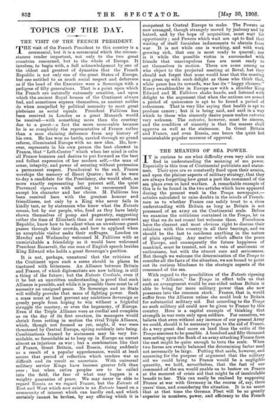TOPICS OF THE DAY.
THE VISIT OF THE FRENCH PRESIDENT.
THE visit of the French President to this country is a ceremonial, but it is a ceremonial which the circum- stances render important, not only to the two great countries concerned, but to the whole of Europe. It involves, to begin with, a full acknowledgment by one of the oldest and greatest of dynasties that the French Republic is not only one of the great States of Europe, but one entitled to as much social respect and deference as if the head. of the Executive were a Sovereign with a pedigree of fifty generations. That is a point upon which the French are naturally extremely sensitive, and upon which the ancient Royal houses of the Continent always feel, and sometimes express themselves, as ancient nobles do when compelled by political necessity to meet great plebeians as social equals. President Fallieres has been received in London as a great Monarch would be received—with something more than the courtesy due to a guest—a fact the more memorable because he is so completely the representative of France rather than a man claiming deference from any history of his own. He has won no battle, carried through no grand reform, illuminated Europe with no new idea. He, how- ever, represents in his own person the best element in France, that " Left-Centre " which when her mind is calm all France honours and desires to put forward as the best and fullest expression of her modern self,—the man of sense, integrity, and power of securing without pretension a permanent respect. Paradoxical to the end, France worships the memory of Henri Quatre ; but if he were to-day a candidate for the Presidency, she would elect, as more exactly representing her present self, the quiet Provencal vigneron with nothing to recommend him except his character and her choice. M. Fallieres has been received here with the greatest honour and friendliness, not only by a King who never fails in kindly tact, or by statesmen who know what the Entente means, but by our people, who, fond as they have lately shown themselves of pomp and pageantry, suggesting rather the time of Elizabeth than of our present crowned Republic, know how to be silent when an unwelcome guest passes through their crowds, and how to applaud when an acceptable visitor seeks their suffrages. London on Monday and Wednesday welcomed M. Fallieres with as unmistakable a friendship as it would have welcomed President Roosevelt, the one man of English speech besides King Edward who holds a great Sovereign's position.
It is not, perhaps, unnatural that the criticism of the Continent upon such a scene should in places be tinctured with bitterness. An Alliance between Britain and France, of which diplomatists are now talking, is still a thing of the future ; but the Entente Cordiale, even if it be but an unwritten understanding, is proof that such Alliance is possible, and while it is possible there must be of necessity an unsigned peace. No Sovereign and no State will wilfully provoke that mass of fighting power. Such a mass must at least prevent any ambitious Sovereign or greedy people from hoping to win without a frightful struggle the mastery, or even the hegemony, of Europe. Even if the Triple Alliance were as cordial and complete as on the day of its first creation, its managers would shrink from setting in motion the rival Triple Alliance, which, though not formed as yet, might, if war were threatened by Central Europe, spring suddenly into being. Combinations framed by statesmen may be very for- midable, so formidable as to keep up in Europe an unrest almost as injurious as war ; but a combination like that of France, Great Britain, and Russia, rising suddenly as a result of a popular apprehension, would at least secure that period of reflection which renders war so difficult and its result so uncertain. With universal military service Kings have become greater folk than ever ; but when entire peoples are to be called into the field, the fear of what may happen is a weighty guarantee of peace. We may never be able to regard Russia as we regard France, but the Entente of East and West which now exists is an Entente based on a community of interest which can hardly end, and which certainly cannot be broken, by any offering which it is competent to Central Europe to make. The Powers as now arranged, though strangely moved by jealousy and by hatred, and by the hope of acquisition, must wait for opportunity ; and Powers which wait are apt to find that waiting of itself furnishes inducements to abstain from war. It is not while one is working, and with work growing rich, that one is most ready to quarrel; nor is it while the possible victim is surrounded with friends that unscrupulous foes are most ready to set themselves in motion. There are some among us who object to the projected meeting at Royal, but they should not forget that none would hear that the meeting was given up with such delight as those who think that, while peace has its rewards, war has its "happy chances." Every swashbuckler in Europe saw with a shudder King Edward and M. Fallieres shake hands, and listened with delight to the argument that when the nations are armed a period of quiescence is apt to be found a period of rottenness. That is very like saying that health is apt to produce cancer ; but it is being said, and said in a way which to those who sincerely desire peace makes ententes very welcome. The ententes, however, must be sincere, and the condition of sincerity is that the masses shall approve as well as the statesmen. In Great Britain and France, and even Russia, one hears the quiet but unmistakable popular murmur of approval.






































 Previous page
Previous page